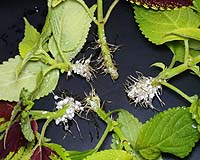 |
Philadelphia, PA (SPX) May 24, 2010 Existing technology can produce biodiesel fuel from municipal sewage sludge that is within a few cents a gallon of being competitive with conventional diesel refined from petroleum, according to an article in ACS' Energy and Fuels, a bi-monthly journal. Sludge is the solid material left behind from the treatment of sewage at wastewater treatment plants. David M. Kargbo points out in the article that demand for biodiesel has led to the search for cost-effective biodiesel feedstocks, or raw materials. Soybeans, sunflower seeds and other food crops have been used as raw materials but are expensive. Sewage sludge is an attractive alternative feedstock - the United States alone produces about seven million tons of it each year. Sludge is a good source of raw materials for biodiesel. To boost biodiesel production, sewage treatment plants could use microorganisms that produce higher amounts of oil, Kargbo says. That step alone could increase biodiesel production to the 10 billion gallon mark, which is more than triple the nation's current biodiesel production capacity, the report indicates. The report, however, cautions that to realize these commercial opportunities, huge challenges still exist, including challenges from collecting the sludge, separation of the biodiesel from other materials, maintaining biodiesel quality, soap formation during production, and regulatory concerns. With the challenges addressed, "Biodiesel production from sludge could be very profitable in the long run," the report states. "Currently the estimated cost of production is $3.11 per gallon of biodiesel. To be competitive, this cost should be reduced to levels that are at or below [recent] petro diesel costs of $3.00 per gallon."
Share This Article With Planet Earth
Related Links ACS' Energy and Fuels Bio Fuel Technology and Application News
 Protein Power for Jack and the Beanstalk
Protein Power for Jack and the BeanstalkTel Aviv, Israel (SPX) May 20, 2010 Plant geneticists are on a determined quest - to control auxin, a powerful plant growth hormone. Auxin tells plants how to grow, where to lay down roots, how to make tissues, and how to respond to light and gravity. Knowing how to manipulate auxin could thus have enormous implications for the production of biofuel, making plants grow faster and better. A recent publication in the journal P ... read more |
|
| The content herein, unless otherwise known to be public domain, are Copyright 1995-2010 - SpaceDaily. AFP and UPI Wire Stories are copyright Agence France-Presse and United Press International. ESA Portal Reports are copyright European Space Agency. All NASA sourced material is public domain. Additional copyrights may apply in whole or part to other bona fide parties. Advertising does not imply endorsement,agreement or approval of any opinions, statements or information provided by SpaceDaily on any Web page published or hosted by SpaceDaily. Privacy Statement |